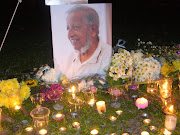 This is a TNP report of 26 Sept 2008 on The Gomez Findings.
This is a TNP report of 26 Sept 2008 on The Gomez Findings.Will Internet have effect on S'pore election?
- No, says WP man in thesis
- Yes, says new media panel
IT has often been said that the 2006 General Election (GE) gave rise to a new constituency: Cyberspace.
Internet-savvy Singaporeans posted reports, photos and videos of opposition rallies on blogs, forums and YouTube.
The Government has since moved to better engage citizens.
But now, one opposition politician is saying that the Internet has had no effect on voting patterns in Singapore and would not have any influence even in the future.
This was the focus of Workers' Party (WP) member James Gomez, 43, in his recently completed doctoral thesis.
His assertion challenges a key idea by Aims - or Singapore's Advisory Council on the Impact of New Media on Society - in its consultation paper.
Aims argues that the new media will become 'increasingly influential'.
Dr Gomez, who was in Singapore last week to receive his doctorate from Monash University, based his conclusion on his study of the past three GEs.
In 1997, 2001 and 2006, the ruling People's Action Party (PAP) won 97.6 per cent of contested seats, Dr Gomez pointed out.
'The evidence shows that the Internet hasn't been able to influence the number of seats won by the PAP.'
What does he say about the Malaysian general election in March, where the Internet was deemed to have played a crucial role in swinging votes away from the coalition government?
Malaysia is different
You can't compare Singapore to Malaysia, Dr Gomez argued.
'Malaysia has a different civil and political society. Ours is up-and-coming. Theirs has matured a little bit more.'
During the March election, the Malaysian opposition was able to harness the power of the Internet.
But Dr Gomez does not think that the same happened with the Singapore opposition during the 2006 GE.
'The individuals, bloggers and online groups make up the bulk of the people producing alternative content, not the opposition parties,' he noted.
He gave statistics in his thesis to support this idea.
In the past 12 years, the rate of Internet home penetration in Singapore rose from 14 per cent in 1997, to 57 per cent in 2001, to 71 per cent in 2006.
But in each of those years, the PAP won 97.6 per cent of contested seats.
Dr Gomez said: 'Just because we have the technology doesn't mean it will lead to a particular result. The Internet may influence voters, but consumption has not led to action. And even if it leads to the action of voting, there is no impact (on the voting result).'
Dr Gomez is also doubtful that the reach of new media will ever surpass that of traditional media.
'While the number of people who consume online content is growing, it still remains small.
'If you try to organise a public activity, reaching out only through the Internet, the turnout will be very small.'
Dr Gomez's study challenges Aims' idea that new media will have a 'profound' effect on the electoral process.
Mr Cheong Yip Seng, chairman of Aims, had said at a press conference last month: 'It's a very clear acknowledgement that the new media is an important part of the exercise and how you use it can have a big influence on the vote.'
Dr Gomez's study suggests otherwise. He said: 'The Aims report seems to be a bit concerned about opening up too much, because it fears that it will have an impact on voter behaviour and, by extension, maybe the electoral results.
'But the evidence shows that it doesn't. Therefore, one doesn't have to be too coy about making online political expression free.'
Aims' reply
In an e-mail reply, Mr Cheong Yip Seng said in his personal capacity: 'Use of the new media for political purposes is governed by laws which we are now reviewing. So I am not surprised if he (Dr Gomez) found that new media in past elections had little influence on the vote.
'If our research is any guide, the outcome of an election rests on many factors, media being only one. There is no reason to believe it will be otherwise in future elections.
'However, it is reasonable to expect that when the law is liberalised, use of cyberspace for political ends will grow.'
Activist and blogger Alex Au is not totally convinced by Dr Gomez's findings.
He said: 'I think his argument is convincing in the short to medium term, assuming that the key features in Singapore's political situation do not change much.'
'Online alternative news and political discussions represent 'potential' which can, for a long while, not demonstrate its effect. But the moment, say, a major scandal or prolonged economic adversity occurs, that potential can suddenly roar to life.
'Politics is never a smooth extrapolation of current conditions. There will be break points and so, I think Dr Gomez may well be proven wrong in the long term.'
This is from Alex Au aka Yawning Bread's article Is engaging the mainstream media pointless? Part 1. The image (above) of the TNP report is from this article as well.
Email reply to The New Paper,
20 September 2008:
> Dear Alex,
> 1. Do you find Mr Gomez's argument convincing? Will the new media have little impact on elections?
I find his sample size (covering just 3 general elections) small, but I don't believe that his conclusions were based on data alone. I think his argument is convincing in the short to medium term, and assuming the key features of Singapore's political landscape do not change much:
* technocratically competent government,
* generally free of corruption and scandals,
* a justice system that is harsh on government opponents thus keeping them at bay,
* mainstream media that is deferential to the government in power,
* electoral system that is designed to be disproportionate towards the incumbent and popular favourite party,
* generally comfortable economic conditions,
* political apathy among the people
* lack of idealism among the people,
* inability of opposition parties to attract talent.
Alternative news and political discussions in online media represent potential which can for a long while not demonstrate its effect, should the landscape remain unchanged. But the moment one or more of the above factors change drastically (e.g. a major scandal that undermines the legitimacy of the government in power, or prolonged economic adversity) that potential can suddenly roar to life.
Politics is never a smooth extrapolation of current conditions. There will be break points (which is to say, that one or more of the above conditions will be overturned - it's just a matter of time), and so I think in the long term, Gomez may well be proved wrong.
> 2. Is AIMS irrelevant because the new media will not have a significant influence on the vote in future elections?
I don't fully understand this question. You may be reading something in AIMS' proposals which I am not. AIMS is planning to propose allowing vodcasts, podcasts and removing the sword of damocles over non-party websites during election periods (i.e. removing the threat of MDA registration). In doing so, I think they are just asking the government to bow to reality. I don't think AIMS aims to create an environment whereby internet chatter will swing elections.
> 3. Do you agree more with Mr Gomez or with AIMS? Why?
See above, I don't really see AIMS arguing the opposite of Gomez's point.
That said, in the forum of 19 September, I was struck by how obsessed AIMS was over the question of "freak election results", even though they didn't use the term. They seemed to be trying their best to recommend some liberalisation, but at the same time, almost paranoid that no opportunity should be provided for emotional videos that might swing an election. In that sense, you might say that AIMS is seeing a scenario that Gomez did not, but then Gomez's conclusions are not warped by such overblown fears.
Alex.














No comments:
Post a Comment